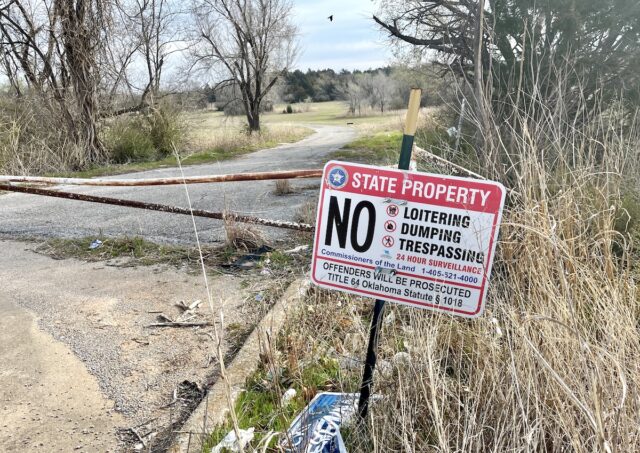

In a new report released Wednesday by the Legislative Office of Fiscal Transparency, analysts found inefficiencies within the operational structure of the Commissioners of the Land Office. LOFT also recommended in its report (embedded below) that the CLO divest itself from land holdings in the coming years.
Overseen by a state board chaired by the governor, the CLO manages about $2.3 billion in state land, property assets and investments in an effort to maximize financial returns for local public school districts and higher education institutions. Within its holdings, the CLO has 750,000 surface acres and 1.2 million mineral acres, along with other securities.
In 2022, the agency distributed $91.5 million to public school districts and $30.9 million to higher education entities in the state, but the agency’s leader — then-Secretary Eliot Chambers — resigned amid scrutiny over his decision to hire an investment company with which he had a pre-existing relationship and to terminate an employee who expressed concerns about the arrangement.
LOFT found that the Land Office’s portfolio has “little impact” at this time given the state’s nearly $4 billion education budget, could grow in the future.
“The impact of CLO’s distributions is less due to investment strategy than it is to the growth in other state funding for education,” the report states. “At current funding levels, CLO’s trust fund corpus is unlikely to ever grow to a level that would make a significant impact on education funds, as the total value of all CLO’s permanent educational trust funds — which includes common and higher education — is less than the state’s annual legislative appropriations for common education alone.”
LOFT analyzed the impact of the CLO on property taxes in Cimarron County, a panhandle county in which the CLO owns one-fifth of all agricultural land. In that analysis, LOFT determined that Cimarron County schools would be better off if the land were taxable.
“The county’s two school districts would receive approximately $1.56 million more in annual funding than what it receives from CLO distributions if the land were generating tax revenue,” the report states.
All told, LOFT found that if the CLO divested itself of land and that land became taxable, it would increase the CLO’s distributions to public schools from about $122 million to about $175 million each year. Land owned by the CLO is not subject to property taxes and therefore does not generate tax revenue.
“LOFT’s conservative estimate calculated that replacing surface holdings with securities would forgo $30 million in lease revenue but replace it with $82.4 million in interest and dividend revenue,” the report states. “Additional benefits to divestment include: increasing the size of the trust through capital gains from land sales, restoring full county property tax collections, ending school district funding disparities between counties that have no CLO-owned land and those that do, and removing the state as a competitor to private land ownership.”
In its formal response to LOFT’s findings, CLO leaders disagreed with the conclusion that its trust fund has “little impact” on education funding.
“While distributions from the CLO Trust may not be a large percentage of the overall educational funding mechanism for Oklahoma schools, the CLO uniquely generates money for public education without the support of tax dollars,” the agency stated. “Notably, employee salaries, equipment, and all other costs of agency operation are paid exclusively from the income generated by the CLO trust, not tax dollars. Unlike the other sources for educational funding that factor into the State’s annual education budget, each dollar distributed by the CLO to public schools is a dollar that taxpayers keep in their own pockets.”
During a hearing Wednesday of the LOFT Oversight Committee, current CLO Secretary Dan Whitmarsh told legislators that the agency isn’t designed to produce robust growth in its portfolio.
“The way our agency is structured, it’s more of a defensive type for the perpetuity of future students, so from a growth standpoint you’re not going to see our agency grow at the level of some of the other pension funds and pension funds in other states because we’re not designed that way,” Whitmarsh said during the meeting. “We’re designed to distribute the interest and dividends from the fund. We’re not able to roll that back into the fund and grow it, so from that standpoint that limits us on how much we can grow it. The way it’s structured is to keep up with inflation so we can have benefits down the road.”
Whitmarsh said the land holdings are a conservative investment that ensures long-term income.
“Surface acres and land holdings are a good hedge,” he said during the meeting. “Land is always a good thing to hold onto because it always has an inherent value. Minerals are the same way. Minerals produce a lot of royalty revenues that go into the corpus, which is a good way to grow that corpus which ultimately pays out interest.”
The report also found that the CLO’s interests can directly conflict with those of state, city and county government, in some cases because CLO-held land is exempt from property taxes.
“While the property holding may yield a positive impact on CLO’s fund, it has a negative impact on counties, county health departments, career technology centers, and in some instances, school districts through reduced tax revenue,” the report states.
Sen. Michael Brooks (D-OKC) questioned CLO officials on the agency’s sole direct investment project, Berry-Rock, a company founded in 2014 by University of Oklahoma classmates Nick Berry and Cameron Rock. The company helps people find mortgages who may otherwise not be able to do so, including those who are retired or self-employed.
The CLO invested $8 million in Berry-Rock and has seen an 11 percent annual return on its investment including a $220,000 dividend paid out in the first quarter of this year, Whitmarsh said.
Brooks asked CLO attorney Bennett Abbott about the agency’s investment, specifically about its legality and whether it complies with the Invest in Oklahoma Act.
“I did,” Abbott said when asked who determined the investment was legal. “Another attorney in my office who has experience with securities looked at it as well, and we also had outside attorneys look at it, and we all concluded the same thing.”
Brooks asked Abbott about Berry-Rock’s history and how it pays out money to the CLO in the form of dividends. Abbot said one of the things that made the mortgage company appealing was its property assets.
“All of the investment is backed by real estate, so if somehow the investment goes south, there are assets to recover our investment,” Abbott said.
Whitmarsh was also asked about LOFT’s second finding: that the CLO’s faces conflicts with state entities that sometimes create scenarios when the state is bidding or negotiating against itself.
“We don’t disagree with these findings,” he said during the hearing. “There is a conflict when there is a state agency that is wanting a building and they want to get the best value and then our mandate is we have to get the highest value. That is a conflict, and I’m not going to disagree with that one bit, and I think it is problematic.”
CLO director of communications and legislative affairs David White said the agency looks forward to making the CLO work as efficiently as possible.
“We stand by our agency response included in the LOFT report and look forward to continuing to work with the oversight committee, the legislature, and our commission to ensure the Trust is operating at peak performance for current and future beneficiaries,” White said in a statement.
The CLO’s official response to the LOFT findings begins on Page 63 of the report. (LOFT’s response to the CLO’s response begins three pages earlier on Page 60.)
LOFT executive director Mike Jackson praised the questions asked by legislative committee members.
“The actions taken by CLO have an impact on other areas of the state, and the Legislature’s role is to direct those actions,” Jackson said. “The questions asked by our [Oversight Committee] members shows their commitment to solve a difficult problem.”
Kirt: ‘Real financial responsibility requires a holistic view’
Sen. Julia Kirt (D-OKC), who serves on the LOFT Oversight Committee, said in a statement that she has concerns about the efficiency of the CLO’s practices.
“Real financial responsibility requires a holistic view,” Kirt wrote. “We can’t just focus on the state’s finances, we have to know what impact our decisions have on cities and local school districts. Based on this LOFT report, I am concerned that CLO may not be analyzing the possible negative impact of their decisions.”
Kirt pointed to property values in OKC as an example.
“Real estate values in downtown Oklahoma City alone have depreciated since CLO took ownership,” Kirt said. “We can’t scrap the entire land trust program without thoroughly assessing risk, but we need to take seriously whether the state’s current management strategy is maximizing revenues while also not undermining local real estate ecosystems. All decisions about property taxation must prioritize funding for K-12 and higher education. We have to ensure CLO’s investments are keeping education a priority.”
Recommendations include selling or subleasing land
In a series of recommendations, LOFT said the CLO could seek to divest its property holdings in the coming years, which it said would result in more money being distributed to schools through tax revenue generated by the land, assuming it could be sold.
LOFT’s recommendations for the Legislature and the CLO moving forward include:
- Directing CLO to adopt a plan to divest of surface land investments over an extended period of time and convert the value of the holding into interest-bearing investments;
- As land holdings are [liquidated], allow for a graduated increase in the limit for percent of funds invested in securities;
- Prohibit the CLO from making direct investments in companies that are not publicly traded;
- Require school districts to make an annual report of the amount of distributions received from CLO and a description of how those distributions were used;
- Amend Title 64, Section 1002A to require CLO to submit a fiscal impact analysis to taxing districts’ governing bodies prior to the exchange or purchase of commercial properties. The report should reflect the impact to ad valorem property tax collections;
- Repeal language in Title 61, Section 327 that authorizes the secretary of the CLO to provide services to sell, transfer, trade or purchase real property for state agencies so that potential conflicts of interest are eliminated;
- Specify permissible uses of money remaining in the Commissioners of the Land Office trust fund after CLO operations are funded through appropriations;
- Create a distribution stabilization fund to be funded out of remaining money in the Commissioners of the Land Office trust fund after CLO’s operating budget is withdrawn, to smooth amounts that school districts receive.
Recommendations for the CLO include:
- Change administrative rules to allow the sublease of agricultural lands for compatible uses;
- To save litigation costs, use the agency’s Royalty Compliance Division to pursue and capture due royalties on the front end rather than retroactively recovering revenues after audits determine full payment was not remitted;
- Provide an annual report to the Legislature detailing all funds expended from the Commissioners of the Land Office fund that are not already included in the agency’s appropriated budget.
Read the full report on the Commissioners of the Land Office
